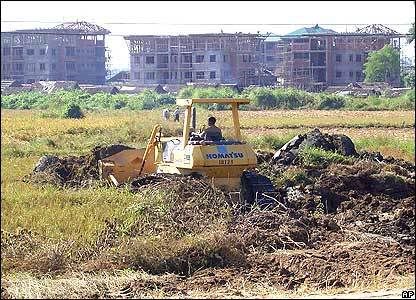
The new capital of Myanmar (BBC News)
Dictator Ne Win ruled Burma (now called "Myanmar") with an iron fist from 1962 to 1988, sometimes employing a style that had the strangeness that still characterizes Burmese rule. He was heavy into astrology, and would make important policy decisions based on the whims of his astrologer(s). To avoid assassination, he allegedly follow a superstition of stomping on a slab of raw meat while shooting his visage in a mirror with a handgun. He even changed the Burmese currency (kyat) denominations to correspond with his lucky numbers, which, needless to say, caused a financial crisis in a country that has always been poor in its recent history.
To this day, Myanmar is ruled by a military junta that "came to power" in a 1988 coup during uprisings where thousands of protesters were murdered. The coup was really just the retention of power by the old dictatorship (but not the old dictator) under a different name. Oppressive regime, Mach II, claims to have embraced democracy, but it is really just a shell game. In 1990, a parliamentary election was held in which the real democratic party, the National League for Democracy, led by Nobel Laureate Aung San Suu Kyi, won a vast majority of seats. The State Law and Order Restoration Council, as the junta endearingly called itself, simply declared the results void, claiming that it was not really an election. The SLORC has been ruling ever since (now calling themselves, even more endearingly, the State Peace and Development Council), the NLD has been kept under raps and not allowed to organize, Aung San Suu Kyi has spent much of her time under house arrest, and Myanmar is riddled with human rights abuses, forced labor, in-fighting, drug smuggling, severe poverty, and fear of government persecution.
It's hard to know exactly what is going on in Myanmar, though. Besides North Korea, it is perhaps the most secretive country on the planet. The media is largely state-run. It is hard for visitors to get far past the major city (and former capital) of Yangon (formerly Rangoon), and sanctions from most Western countries make it difficult anyway. If they do, it may very well be that they will be surveiled by government spies. The regime doesn't want to show outsiders what they already know: how poorly the country is faring in terms of economic and social indicators.
But now things may become even more secretive, because, in a move that has simply bewildered many observers, the regime is moving the capital from Yangon, on the coast of the Bay of Bengal, to near the town of Pyinmana, in the center of the country. More specifically, it is creating a new capital from scratch, called Naypyidaw.
Burma's decision to shift its seat of government has left many analysts at a loss to explain the move.While all Myanmar government offices will be moving to Naypyidaw, diplomats and embassies have not been told to follow, which might pull the plug on the already tenuous awareness outsiders have of Burmese affairs.
After all, why go to the huge trouble and expense of relocating thousands of officials to a remote mountainous region, when there is a well-established political infrastructure in the port city of Rangoon?
[snip]
[Analysts] said the real reason was probably still a mystery, but it was possible the country's hard-line military rulers were worried about foreign invasion, or wanted more control over ethnic minorities in the border regions, or were even following the advice of fortune tellers.
[snip]
Joseph Silverstein believes the most likely explanation for the relocation is advice by traditional Burmese fortune-tellers.
"Everybody listens to fortune-tellers in Burma," he said.
General Ne Win, who came to power in 1962, was totally dependent on their advice, Mr Silverstein added.
"He is once said to have decided to change the direction of traffic overnight [as a result of a fortune teller]. It caused a huge number of accidents," he said.

No comments:
Post a Comment